- Home
- Andre Dubus III
Gone So Long
Gone So Long Read online
GONE SO LONG
A Novel
ANDRE DUBUS III
W. W. NORTON & COMPANY
Independent Publishers Since 1923
NEW YORK LONDON
Gone So Long is a work of fiction. Names, characters, places, and incidents are the products of the author’s imagination or are used fictitiously. Any resemblance to actual events, locales, or persons, living or dead, is entirely coincidental.
For Ariadne
Tell me.
Who was I when I used to call your name?
—FROM “PRAYER,” by MARIE HOWE
GONE SO LONG
My father’s parole officer had an office above a shoe store in Lawrence, Massachusetts. The street was a wide two-lane of sparse traffic, cars parked in front of parking meters built in the 1950s, and the buildings on both sides were made of the same red brick as the mills along the river. There were rectangular blocks of granite above each window, the roofs flat, and on the first floors were one shop after another, leather goods and a bakery, an office supply next to an Army and Navy outlet next to a jewelry store, its display window a dusty glass case whose shelves held little.
A cop glanced at my bare legs and climbed behind the wheel of his cruiser and drove up the street. I stood there on the sidewalk a long time in the sun. Or maybe I went walking. I may have gone walking because so many of the shops and storefronts were closed, their doors shuttered, some of the windows cracked and taped or half covered with boards screwed into the bricks. It was the kind of street that existed before shopping malls and it reminded me so much of Arcadia, the Florida cattle town I’d grown up in, how it was stopped in time, that it was like I’d stepped into a dream I was having where I wasn’t dressed and very soon I would get caught doing something I shouldn’t be.
Three brown boys walked by me in baggy basketball shorts and shoes with the laces untied. One of them had a red pick in his hair, and they couldn’t’ve been older than eleven or twelve, but as they passed me one of them said something in Spanish and all three laughed. A door opened and a man in a tie walked out, his eyes on me. There were the smells of coffee and cooking onions and cigarette smoke, and I walked through the door he’d just come out of. Italian music was playing. There was a row of booths, two of them filled, a flash of hair and faces, and a long counter with stools, but I was moving to a small table at the window. It had a dirty plate on it, and a half-empty coffee cup. I sat there anyway.
From the table I could look up the street and see the entryway to the interior stairwell of Parole Officer Xenakis’s office. It was made of red brick, the steps granite, the bottom one in sunlight but the rest in shadow . . .
This opened something in the young woman that came as a surprise to her; once, when she was fifteen and had just begun to smoke, she had to hide it from her grandmother, Lois, who smoked herself but wouldn’t allow her granddaughter to do the same, so Susan had to sneak outside. A few times she’d done it against the wall of the house, but she was afraid Lois would see her rising smoke through a window so she started doing it deeper in the trees near the river.
One afternoon it was so hot she could smell the rot in the dead branches on the banks. She could smell the wet sand and clay and the tiny crayfish. She could smell gator shit and Spanish moss and her own sweat. But what she never smelled were the brown and gold scales of the cottonmouth snake coiled a foot from her bare feet and legs. When she looked down and saw it, she’d just taken a deep drag of her cigarette and now she nearly coughed but did not move. The cottonmouth’s triangular head was resting on its own coil, its eyes pointing at her ankles. How could she have been so stupid? How could she have allowed herself to be so exposed? She did not move. She slowly exhaled smoke through her nose, and maybe she’d made a noise of some kind, for the snake lifted its head and opened its white mouth and Susan was sprinting back through the trees and this is the moment that came to her as she watched the shadowed entryway of her father’s parole officer’s office.
It hadn’t occurred to her that what she was doing could be dangerous. This came as much a surprise to her as the warmth of the smiling waitress who appeared at her table and began to clear away the dirty plate and fork and half-empty cup.
“Menu, sweetie?” The woman had dyed blond hair, brown eyebrows, and large breasts. Wrapped around her hips was a soiled apron like she did some of the cooking, too.
Susan said no thank you and ordered iced tea.
“You got it.” The woman held the plate, fork, and cup in one hand and was wiping down the table with the other, but she kept staring at Susan, smiling at her. “Honey, you are gorgeous. You should be in the movies.”
Susan had heard this before, but only from a few boys who wanted what some of them got from her, never from a woman the age her mother would have been. Susan may have thanked her for her compliment, or maybe she didn’t. But she sat there feeling sorry for herself.
No, she sat there feeling the warm, fleshy presence of what she’d been denied. Her grandmother had never been big on compliments, and when it came to Susan’s looks it was always words of warning about not looking too trashy. About spending too much time on her hair and makeup, which she rarely spent much time on at all. On how tight her tops were and she was too old to leave the house without wearing a bra.
But never just a sincere compliment from a woman who’d been her age only twenty years earlier.
Then through the window and up Canal Street, a man stepped out of that shadowed entryway into the sun. He was tall and thin and wore a tank top and sweatpants and sandals. From where Susan sat, he looked half black, too. She watched him turn and walk up the street.
The waitress brought her iced tea and set it in front of her with lemon and packets of sugar.
“Let me know if you need anything else, honey.” She kept smiling down at her, taking her in as if she were a true gift to her day, and Susan smiled up at her and thanked her, and maybe that’s when the anger started. There was how much she enjoyed this woman’s attention, how surprised Susan was that she’d needed it.
Why was she even here?
It wasn’t her father she’d needed at all.
For over an hour she sat at that table. The last of the lunch customers—three old women speaking Greek or Italian on their way out the door—had gone, and Susan saw two more men come and go from Nicholas Xenakis’s entryway. The first was obese and wore loose gold chains around his neck, his hips rolling as he labored his way up to the street corner. That couldn’t be him, could it? No, she felt nothing seeing him. Nothing. The second was in a white shirt and tie and suit pants and was probably her father’s parole officer himself. He’d stepped out onto the sidewalk and smoked a cigarette. He had black hair cut as close as a cop’s, and every few drags he’d point his face up at the sun and close his eyes. It made her want a cigarette, too, and she ordered more tea and went out to the sidewalk and smoked one.
Cars passed. The sun felt good on her face and arms. The man went back up the entryway’s stairs and she went back inside to her table. Two men in summer suits walked by soon after that. They looked like bankers, or maybe she’s just remembering that now as her older self writes this. It doesn’t matter. But every man she saw was beginning to feel predatory to her in some way.
A few minutes later a beefy man in a blue T-shirt walked up the sidewalk on the other side of the street. His hair was tied back in a short ponytail, and he had the heavy brows of a boxer, and she hated him. Even when he kept walking past Nicholas Xenakis’s entryway.
The next morning she sat at that same table and that same warm waitress served her a poached egg and black coffee. Two men in a booth kept staring at her. They wore blue work shirts with the name of some company stitched onto the shirt pockets. The fatt
er of the two had a brushy mustache and he kept elbowing the man beside him, who laughed and said something to the two men across from them Susan could not see. This attention was not new. It was what she’d known since Gustavo, and she had come to expect it, to rely on it like money in an account she could draw on whenever she needed it. But that morning, hoping and not hoping to see her father, this part of her felt like one big debt and every man she saw was coming to collect.
This second morning was hot, the sky a gray haze. She kept imagining taking her cup of black coffee and carrying it over to that booth and dumping it into the face of the pig with the brushy mustache. She’d been there just under an hour, and her waitress was busier than she’d been the day before, though she still seemed so very happy to see her and kept calling her honey. Susan knew she called lots of customers that, but she was taking it in like cool water. She was just about to leave when up the street a man stepped out of Nicholas Xenakis’s entryway onto the sidewalk.
Something sick and electric hummed through her. He had a hooked nose and long sideburns. His hair was combed back, and he seemed big even from where she sat, his hands big, his feet, his shoulders which sloped in a white T-shirt. He stood there a moment. It was like he wasn’t sure where he was supposed to go next and he was waiting for someone to tell him. He looked up Canal Street then down it, and that’s when she saw how close together his eyes were, how thick his forearms were. And then he started to walk, stepping off the curb into the street, and his arms hung still, or moved but did not move much, and she could smell fried clams and the ocean and she knew.
She felt like throwing up. She stood and rushed by the booth of men and the long counter, its stools taken up by people she’d never seen come in. Then she was in the locked bathroom, sitting on the toilet, her shorts and underwear around her ankles, breathing hard. A slick sweat came out on her forehead and throat, and there were the smells of floral deodorizer and old grease. The floor was linoleum. She stared at it. It was white with gray swirls, a faux-marble, and on the wall was tacked a poster of the Amalfi Coast of Italy. It must have been taken from a plane or helicopter, these cliffs of stone villas built along winding roads above a beach on the Tyrrhenian Sea, though she would not know the name of that water then. That would come years later when she’d fly to Naples for a week with Saul Fedelstein, when she’d stay in a hotel on those very cliffs overlooking that same beach.
Or maybe it was not that beach or that part of the Amalfi Coast, but what stays is that Susan emptied her bowels then, and if that man with the hooked nose and the big forearms had walked into that restaurant on Canal Street, if he was somewhere on the other side of that bathroom door, the place may as well have been filled with writhing cottonmouths, for what stays, too, is the sting in her side, everything leaving her too fast, the linoleum at her feet, and she saw the young woman she knew had been her mother curled on that linoleum, and the sting in her side became a burn and then was gone as quickly as it had come, and Susan sat in her own stench feeling the soft open utility of her own organs, and my God, how could he have done it?
Those big hands and thick forearms. All that power and he still reached for what he reached for.
And so what was Susan to him? What was she to anyone?
PART
ONE
1
ONCE AGAIN her name moves through Daniel’s blood like floating debris. It scrapes along his bones and pokes at his old organs and it is a steady, pulsing nudge in his head. For days now it has lodged itself in the searing ache in his hips and lower back, and he knows there’s only one way to free it, but first he needs to finish these chairs he’s caning under the sun. His eyes sting. His work glasses have slipped to the end of his nose. Daniel takes them off and lets them hang around his neck. He wipes the sweat off his forehead then stands to stretch his back, but the pain remains, the sickness deep inside him now, he can feel it. It’s not going anywhere. He sits on his stool and puts his glasses on and gets back to work.
Today he notices his hands. They’re his old man’s—thick fingers, chipped and yellowed nails, though his father’s always had carnival paint in his cuticles that never came out. Daniel reaches for the nail file he uses to weave the cane under and over itself. A warm wind kicks up from the east and brings with it beach sounds, or maybe it’s just Daniel’s memory of them—the creaking gears of the Ferris wheel and the popping water balloons and the cries of gulls. There’s the tinny whine of the carousel organ and the rattling jerk of the roller-coaster cars, the shrieks of women and children hurled out over the hissing surf. But always there comes, rising up from inside him and getting louder, the blaring rock and roll of the Himalaya: “Sugar, Sugar,” “Proud Mary,” Tommy Roe singing he’s so dizzy his head is spinning. Yesterday, after months of thinking about it, Daniel finally drove around the Midway, and it isn’t half what it used to be. The wooden roller coaster was torn down years ago, and the Ferris wheel they have now is kiddie-sized, the Himalaya gone, though there’s a strip club with tall white columns at the doors. Half a block down from that, in the front window of a souvenir shop, a male mannequin in swimming trunks stands among beach towels and hula hoops under a two-month-old hand-lettered sign: Father’s Day Sale/Half Price. Daniel hasn’t seen his daughter in forty years, and there is so much to tell her, but why would she listen?
There was her mother’s brown skin, her long wet hair that smelled like the ocean and baby oil and made him want to kiss every part of her. There was her small face and straight back, her breasts and brown nipples. All these years later he can still see them, the tiny dark freckles around them, how white her breasts looked, the rest of her always so tanned because they were both amusement park kids who lived at the beach: Danny Ahearn, Liam’s son, the artist’s boy, though only a few called his father an artist. They called him Ahearn or Old Liam or the Magic Mick because he could take sea-air-beaten shit and make it new again: the giant clown’s head on the roof of the Fun House, all the signage for joints up and down the Midway—the Five O’Clock Club, Willey’s Hard and Soft Ice Cream, the Pavilion and Bath House and Shaheen’s Fun O’Rama Park.
And Linda’s father owned the Penny Arcade. Her family lived there too, though you wouldn’t know it. Past the Skee-Ball and slot machines, the pinballs and billiard tables, was a black wall, and on the other side of that wall was the apartment Linda lived in with her mother and little brother Paul and her father, Gerry Dubie, who hated Danny because he could smell how much he wanted his Linda. Everybody wanted her, and that was the problem.
No, that’s old thinking. The problem had always been Danny’s. For him it was more than just wanting; it was a need so fierce his own body felt like a too-tight suit, like the blood in his veins was about to turn on him until he was with her again. And then when he did have her, that hot worm of possession burrowed into his heart. He’d never been one of the handsome boys, not like Jimmy Squeeze who got his name because he could hold a pencil between his chest muscles, or Tony Scarf with his long hair and five hundred Skee-Ball tickets hanging off one shoulder, or Manny Pina and his lean torso and face you could put on a cereal box. And there were so many others, beach raff from all the stinking mill towns of the Merrimack Valley, sometimes a few rich boys from Boston or New York who rented air-conditioned cottages on the sand past the barrooms at the edge of the strip. But Danny had something the others did not, something he never would have known about if Will Price hadn’t told him that afternoon in May 1969, the season just about to kick into gear.
Cane likes wet heat, like this morning’s. This is the sixth of eight chairs from a one-hundred-year-old dining set, and he’d had to refinish each one before the caning could even begin. The other seven are within easy reach, like everything, because he lives small.
His trailer rests against a stand of torch pines so overgrown the branches cover his tin roof, and when it’s hot like today, the pitch goes soft and he can smell it and the ocean as he works in the yard. It’s a forty-by-forty patch of gr
ound he did not earn, but it’s his anyway. Three years ago he hired a man to build him a tall plank fence, enclosing Daniel’s single-wide in this square with a narrow gate for his Tacoma. He hired a carpenter to build him a small shop for his caning, one he framed on concrete against the west fence, and Daniel liked how much smaller that made his patch. He was paroled twenty-five years ago, but really, he’s never been all the way out. His days and nights are as regimented now as they were then: awake at six, in the shop by seven, lunch at eleven, and the rest of the day—unless he’s late with a piece of furniture—he drives over the river into Port City and the Council on Aging, picks a name, and drives an old man or woman to a doctor’s appointment or to the plaza to shop for food and medicine. If he’s not needed, it’s his schooling time. Sometimes he lies on his bed in the trailer and listens to a book on tape, history mostly. He just finished a long one all about John Adams. Or he goes to the library, a one-story building in the town square where it’s cool in the summer, warm in the winter, and he likes the three ladies who work behind the desk, though only one of them works there at a time. People might think he doesn’t like women, but he does. He’s never stopped, though there is one older one he stays away from. She’s tall and her hair is gray like his, and she does her work standing up. A few times when he’s come in, she’s glanced at him over the rim of her glasses like she thinks she might know who he is but doesn’t remember exactly, though she knows it isn’t good. It may have been a mistake to come back here, but when his mother got sick he just had to, and now she’s been gone three years, and nobody was more surprised than he was that she died with some money, leaving him—at this late age of sixty-three—with his first home, a shop, and this patch of ground he sweats on under the sun.

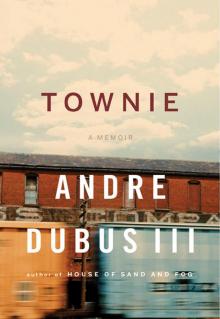 Townie
Townie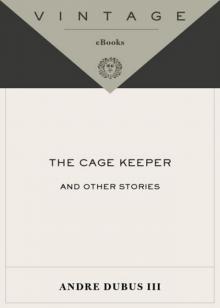 The Cage Keeper and Other Stories
The Cage Keeper and Other Stories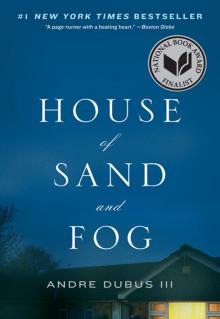 House of Sand and Fog: A Novel
House of Sand and Fog: A Novel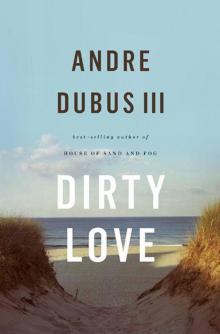 Dirty Love
Dirty Love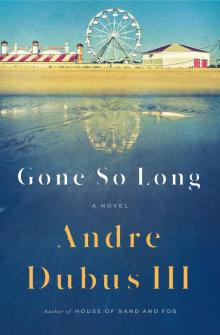 Gone So Long
Gone So Long The Garden of Last Days
The Garden of Last Days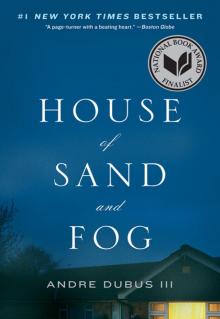 House of Sand and Fog
House of Sand and Fog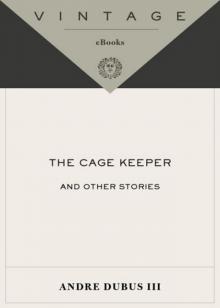 The Cage Keeper
The Cage Keeper